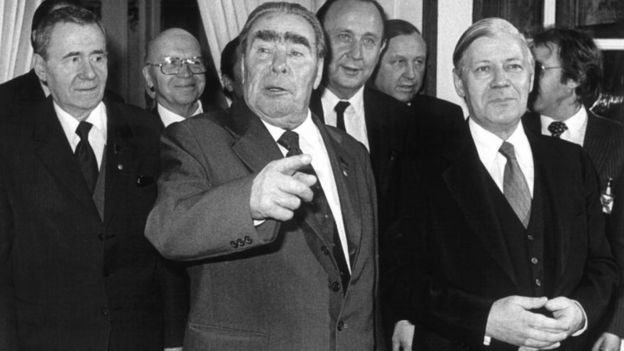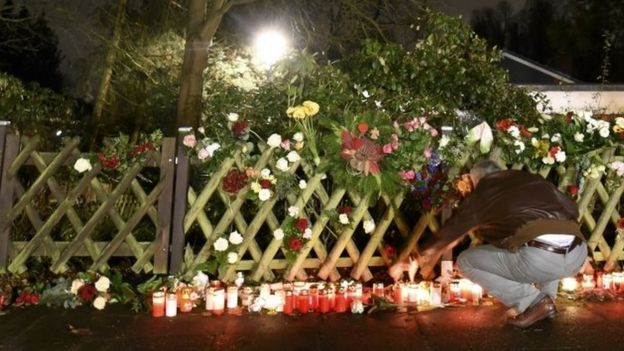
Helmut Schmidt, who served as West German Chancellor from 1974 to 1982, has died aged 96, his office says.
Mr Schmidt, who was a Social Democrat, was an architect of the European Monetary System, which linked EU currencies and was a key step on the path to the euro.
He was credited with helping to consolidate the country's post-war economic boom.
He is seen as one of the most popular German leaders since WWII.
Mr Schmidt died on Tuesday afternoon in his home city of Hamburg, his doctor Heiner Greten was quoted as saying by German media.
The doctor provided no further details.
Reacting to the news, European Parliament President Martin Schulz said he was "deeply affected" by the death.
"He was an outstanding chancellor, his death marks a turning point for Germany and Europe," he said.
European Commission President Jean-Claude Juncker said: "The news of the death of Helmut Schmidt has moved me deeply."
He added that Europe lost "a special man whose political courage has moved many."
Paying tribute to Mr Schmidt, French President Francois Hollande described him as "a great European".
"He was a man who, until his final breath, knew how to give a speech and especially to tell Germans that they had a role to play... that it was within Europe that they should act", Mr Hollande said.
 AFP
AFP
Helmut Schmidt was a far-sighted strategist who lived to see his ambitions for Germany fulfilled in 1990, the BBC's Jenny Hill in Berlin reports.
By 1972, Mr Schmidt was finance minister in the government of Willy Brandt, a brilliant manager of the economic miracle. Two years later he himself was chancellor.
The Berlin Wall dividing West and East Germany was the front line in a dangerous Cold War at the time.
With skilled diplomacy, Mr Schmidt pursued detente with communist leaders on the other side, but when the Soviet Union stepped up the arms race, he stood firm, our correspondent says.
Braving fierce protests at home, he let America deploy medium-range nuclear missiles on West German soil to keep the military balance.

Analysis: BBC's Jenny Hill in Berlin
 Reuters
Reuters
The German newspaper Spiegel has described him as "the pilot of the century", and Helmut Schmidt certainly guided his country through tumultuous and dramatic times: economic recession, the great oil crisis of the 1970s.
But, arguably, he'll be remembered most vividly for his refusal to negotiate with the home-grown terrorism of the far-left Red Army faction.
In 1977, the RAF terrorised Germany with a bloody and intense campaign of violence. When, later that year, Palestinian hijackers forced a German passenger plane to land in Mogadishu and demanded the release of several RAF leaders from prison, Helmut Schmidt ordered special forces to storm the plane - killing three of the hijackers.
Today in Germany he was remembered as skilled diplomat who eased Cold War tensions, forged a lasting relationship with France and laid the foundations for the European Union.
His legacy - said German Vice-Chancellor Sigmar Gabriel - was Europe.
"In 2011 he gave his last great speech. He reminded us that Germany must not overplay its leadership role in Europe and that we have a responsibility to keep Europe together. In these days and weeks when people are disappointed by developments in Europe these words will ring in our memory," Mr Gabriel said.
Helmut Schmidt will be remembered for his wit, his abilities on the piano, but also for his chain smoking.
During the last years of his life he refused to extinguish his beloved cigarettes - even while appearing live on television.
The German tabloid newspaper Bild puts it simply: "Germany mourns."

Strongly pro-European, Mr Schmidt together with French leaders launched the European Monetary System in 1979. This later paved the way for the euro.
He will also be remembered for leading his country through a period of political violence in which groups - such as the Red Army Faction - carried out bombings and kidnappings, our correspondent says.
In 1982, the coalition led by Mr Schmidt's party collapsed and he lost power to Helmut Kohl.
'Big Mouth Schmidt'
Born in a tough, working-class district of Hamburg in 1918, a month after the end of World War I, Helmut Schmidt spent his early years in a Germany wracked by political, economic and social strife.
Aged 14 when the Nazi Party came to power, he became a group leader in the Hitler Youth, joined the German army in 1937 and, during World War II, saw action on both the eastern and western fronts.
Promoted to first lieutenant rank and the recipient of an Iron Cross, Helmut Schmidt was captured by the British after the Battle of the Bulge in the winter of 1944-45.
While in captivity, his fellow prisoners of war convinced him to become a Social Democrat. Joining the party on demobilisation in 1946, he progressed effortlessly through its ranks.
He graduated from Hamburg University in 1949, having been national chairman of the Social Democrats' student wing, and became an economic adviser to the Hamburg government.
He was elected to the federal parliament in 1953, where his verbosity soon earned him the nickname "Schmidt-Schnauze" (Big Mouth Schmidt).



No comments:
Post a Comment